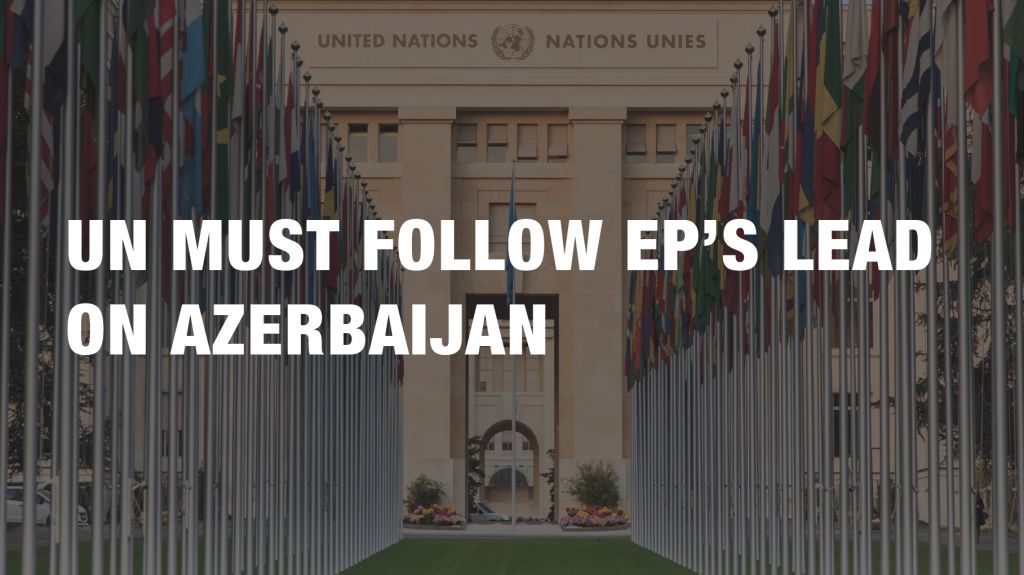In the statement, HRHF detailed how the human rights situation in Azerbaijan has steadily deteriorated since the beginning of the crackdown on civil society in 2011. This includes the Human Rights House Azerbaijan being forced to cease activities, and the wave of attacks and arrests against human rights defenders, journalists, lawyers, and anyone critical of the government in 2014. Significantly, all of these did not meet the threshold for UN action on Azerbaijan.
“Given… the continued crackdown on civil society in Azerbaijan… and the multiple thresholds that have been passed in recent years, the United Nations Human Rights Council has a responsibility to act,” said HRHF in the statement.
Azerbaijani journalist Afgan Mukhtarli disappeared in Georgia on 29 May, and reappeared facing charges in an Azerbaijani court on 31 May. HRHF invited Council members to consider the number of human rights violations that must have occurred in Afgan Mukhtarli’s case. It also highlighted other developments affecting the safety of Azerbaijanis who have been forced to flee Azerbaijan.
As HRHF urged the HRC to take action on Azerbaijan in Geneva, it was also working to ensure the EP passed an informed resolution on the disappearance of Afgan Mukhtarli in Strasbourg. In the resolution adopted on 15 June, the EP strongly condemned his abduction, stating that it considers this action to be a “serious violation of human rights,” and condemning “this grave act of breach of law.”
It also calls for an effective investigation by the Georgian authorities, and on the Azerbaijani authorities to release the journalist and drop all charges against him. Members of European Parliament also focused on other politically motivated cases, calling for the immediate release of journalists, human rights defenders and activists.
A request by the European Commission to postpone the adoption of the resolution, until after its visit to the country, was turned down by MEPs, as they expressed their frustration at the escalation of arrests in Azerbaijan that culminated with the abduction of Afgan Mukhtarli. MEP Pavel Telička (Czech Republic/ALDE) in particular argued that not adopting the resolution would send the wrong message to the Azerbaijani authorities, and reiterated that Afgan Mukhtarli’s abduction happened just a few days after a high-level visit of the EP to Azerbaijan in which MEPs shared human rights concerns.
The European Union and Azerbaijan started negotiations on a new comprehensive agreement in February 2017 following a visit of President Aliyev to Brussels.
“Ongoing negotiations represent a key opportunity for the EU to demand that the Azerbaijani authorities finally take concrete steps to improve the human rights situation in the country, starting with the release and dropping of charges against dozens of arbitrarily imprisoned human rights defenders, journalists, lawyers and activists. For those now released, restrictions such as travel bans and the freezing of bank accounts should be lifted immediately,” stated Florian Irminger, HRHF’s Head of Advocacy.
Such agreements require the EP’s consent; the resolution stressed that “democratic reforms, the rule of law, good governance, and respect for human rights and fundamental freedoms must be at the core of the new agreement.”
EU Commissioner for European Neighbourhood Policy and Enlargement Negotiations, Johannes Hahn, visited Azerbaijan the day after the adoption of the resolution. During the trip, he met with civil society representatives and reiterated that fundamental freedoms and rule of law are at the centre of EU relations with countries of the Eastern Partnership, which include Azerbaijan.
HRHF will continue to advocate for action on Azerbaijan from the international community.
“We thank States such as Norway, Ireland, Germany and the USA for raising Azerbaijan at the Human Rights Council. At the September session of the Council, we urge them and others, including non-European States, to address Azerbaijan’s use of arbitrary detention. Its use of this practice – as detailed in our report Breaking Point in Azerbaijan and confirmed by the UN Working Group on Arbitrary Detention – is intolerable and should be considered so by Member States,” concluded Florian Irminger.
Documents:
More on Azerbaijan:





